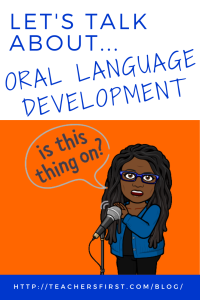Oral language development is a crucial part of the Science of Reading. The science tells us that while phonics, decoding, and sight recognition (the lower strands on Scarborough’s Reading Rope) are foundational, students will only become fluent readers with appropriate language development. Language skills help students to understand and discuss texts.
Weaving oral language development into everyday instructional activities can be done with a little strategy. For example, if you and your students plan to participate in this year’s African American Read-In, here are some ideas that allow your class to use it to focus on building your students’ oral language skills.
Elementary:
- Introduce the African/African American traditions of storytelling. Share an African American folktale or two. Encourage your students to join the storytelling tradition by retelling an African American folktale in their way. Students could use BookCreator (reviewed here), WriteReader (reviewed here), or Elementari (reviewed here) to create a digital retelling of the story. Retelling stories allows students to practice narrative structure and descriptive language.
- Share Flip events with authors Jason Reynolds and Stephen Curry with your class to introduce the concept of personal strengths. Help students identify their strengths and reflect on how they view their strengths. Ask students to record a short story about using their superpower with Flip (reviewed here) or Adobe Animate from Audio (reviewed here). Recording this will help them develop narrative and explanatory speaking skills.
- Use poetry by African American poets like Langston Hughes or Amanda Gorman for a poetry unit. Ask students to prepare a performance of a poem of their choice. Having students recite, sing, or dramatize what they have read allows them to practice language structures.
Middle School:
- Introduce the concepts of student activism and personal memoir using books such as Brown Girl Dreaming by Jaqueline Woodson, Turning 15 on the Road to Freedom by Lynda Blackmon Lowery, or Marley Dias Gets it Done: And So Can You! By Marley Dias. Follow up by having students record their podcast about a personal or social issue using Online Voice Recorder (reviewed here) or Vocaroo (reviewed here). Podcasting helps students learn to speak persuasively and passionately.
- Discuss cultural influences on African American poetry. Host a poetry slam encouraging students to share their stories of resistance and resilience. Performing poetry boosts public speaking confidence.
- Use Flip to set up virtual discussion spaces for students as you introduce books written by African American authors. The book club questions might even be the same for each book. Discussion allows students to practice their verbal reasoning skills.
High School:
- Ask students to explore the intersection of African American Poetry, history, and culture by creating a timeline of the works of an African American poet and social movements. Students could use Padlet (reviewed here) or Timeline JS (reviewed here) to create their timeline narrative. This activity will promote analyzing literature in its cultural and historical context.
- Organize a debate on an African American literary theme. Teachers can use Kialo Edu (reviewed here) to help students prepare their arguments for the discussion. Debating strengthens reasoning, research, and persuasive speaking abilities.
- Use Twitter to find #GridPals for your class. Use Flip topics to structure conversational exchanges about books by African American authors.
The African American Read-In provides a valuable opportunity to promote literacy and highlight the voices of influential African American authors. By incorporating oral language activities, we can leverage the event further to build our students’ essential speaking and listening skills. As we celebrate African American literature this year, consider small but meaningful ways to engage your students in rich discussions and practice using language confidently.


